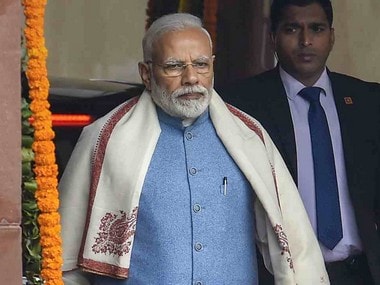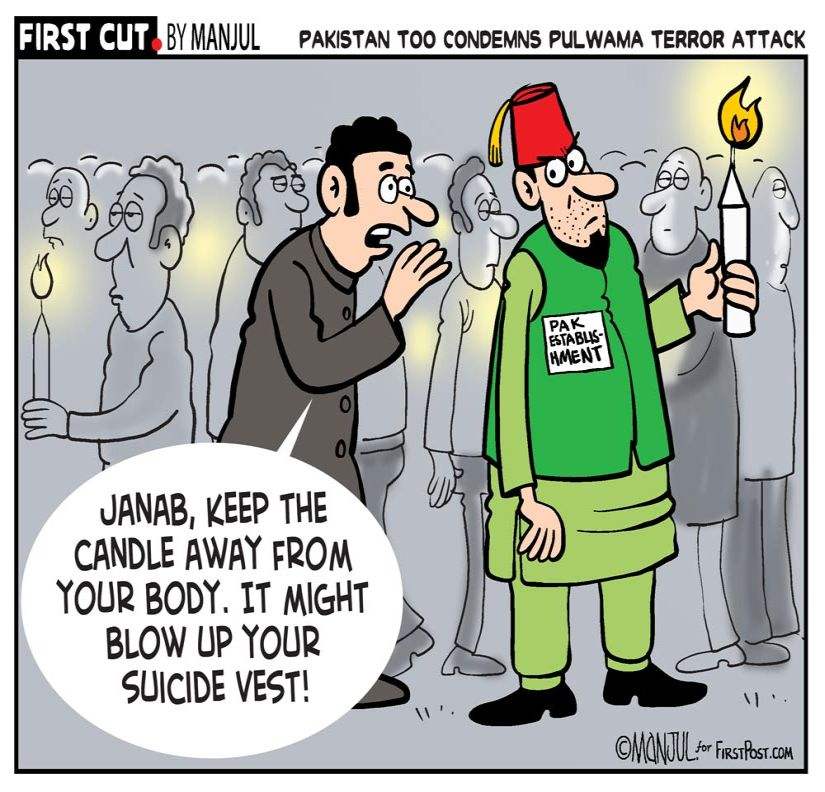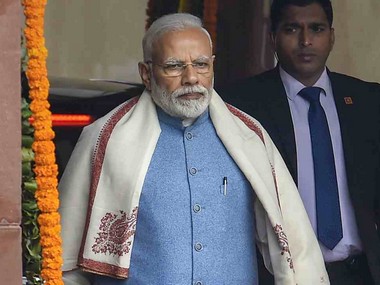The WhatsApp groups are buzzing. Some are clamouring for revenge, some are baying for blood, while some want India to occupy Islamabad. It is easy for commentators to sneer at such reactions, but they don’t have to seek a mandate in elections from voters who are justifiably angry at the savagery that occurred in Pulwama on Thursday: officially India’s worst terrorist attack on security forces in Kashmir. The politicians, however, must contend with the outrage sweeping across the nation. This would have been a challenging prospect for any government at any point in time, but the timing of the attack, the number of CRPF personnel killed (42 according to latest reports) and the issues involved in the incident make it a potent mix that may lead to substantial political fallout in the impending Lok Sabha elections. Make no mistake, Pulwama has put the government of Prime Minister Narendra Modi on trial. [caption id=“attachment_6000671” align=“alignleft” width=“380”]  File image of Prime Minister Narendra Modi. PTI[/caption] Pakistan-based terrorist outfit Jaish-e-Mohammad claimed responsibility for the terror strike that occurred when an explosive-laden (possibly IED device) civilian vehicle rammed into a 70-vehicle CRPF convoy passing through the Gundipoora section of the Srinagar-Jammu Highway. A 22-year-old local JeM suicide bomber was driving the SUV, but he was assisted by other JeM operatives at the spot who opened fire on the troops. The attack has several dimensions. One, it is an audacious strike on the might of Indian State by a Pakistan-nurtured-and-sponsored terror outfit. It not only concerns the issue of national security and India’s lack of a deterrence mechanism against Pakistan’s asymmetric war, the scale and accuracy of the strike also raise uncomfortable questions about intelligence failures at multiple levels. Two, the attack was carried out by JeM, considered by some analysts as the “sword arm” of Pakistan’s intelligence agency Inter-Services Intelligence (ISI) that uses terror as a tactical tool to bring India back to the negotiating table. This reinforces the notion that Prime Minister Imran Khan’s “friendly” overtures towards India and the “Kartarpur Corridor” were little more than eyewash. The foibles of India’s Pakistan policy have been exposed again. A third dimension is the involvement of Masood Azhar, the radical cleric and terror mastermind who orchestrated a spate of attacks on Indian soil, including the Uri massacre, the attack on Pathankot airbase and the stunning terror assaults on Indian Parliament and the Srinagar Assembly. It won’t be comforting for India that it was compelled to release Azhar in exchange for the hijacked passengers of airplane IC-814 in 1999. These issues are legitimate, volatile, emotive, temporal, and in all likelihood the Pulwama attack and the Modi government’s response to it will define the 2019 electoral campaign. If the attack on Indian forces in Uri sector where 19 jawans were killed caused enough outrage in India for the government to order a “surgical strike”, then Pulwama must be answered with a proportionate and comprehensive response that needs to be several grades above the precision strike carried out by Indian Army on terrorists and their infrastructure along the Line of Control in 2016. Add to this the Modi government’s stated ‘hardline’ and ‘zero tolerance’ policy against terror: not to speak of the prime minister’s carefully constructed ‘strongman’ image and it is easy to see that the government is under huge pressure to act. Let us now take a look at the actions it has already taken or may yet take to get its message across in India that Pulwama will be avenged and across the border that its threshold of tolerance for such attacks is progressively lower and will result in massive retaliation. India’s options can broadly be divided into two categories: diplomatic and kinetic. In the diplomatic arena, the government has already taken a series of measures to convey to Pakistan that it will have to pay a “heavy price” for this misadventure: a line that has been repeated by the prime minister and all ministers in his Cabinet. The Cabinet Committee on Security met on Friday and decided to revoke the ‘Most Favoured Nation’ status conferred on Pakistan: a calibrated step, but also a low-hanging fruit. Revoking of the MFN status is unlikely to severely hurt Pakistan owing to minimal bilateral trade, but it may add to the troubles facing Pakistan’s tottering economy. India has also summoned the Pakistan High Commissioner and issued a “strong demarche”, but questions may be raised why Sohail Mahmood wasn’t packed off home on the next available flight. When the objective is a statement of intent, do “demarches” serve any purpose? More so in the case of Pakistan, which has already denied any role in the attack (as it has done many times in the past). India has also sought to “completely isolate Pakistan” for “incontrovertible evidence” of its hand in the terror attack and has vowed to work with the international community to fructify this strategy. The trouble with this step is that India’s efforts will likely square up against Pakistan’s close relationship with China, Saudi Arabia and the UAE: all of whom have recently come to Pakistan’s aid to help sustain its economy. India’s motive may also be frustrated at the tactical alliance that Pakistan enjoys with the US and Russia: both of whom see Pakistan as an errant, but indispensable strategic partner. India has also indicated that it will push for Comprehensive Convention on International Terrorism at the UN where there has been no consensus since 1986 over a definition of the word ‘terrorist’. India’s dualism here is glaring. On the one hand India wants the world achieve a consensus on CCIT ostensibly to pressurise Pakistan, and on the other hand the government fails to back a private member’s bill in Parliament that seeks to declare Pakistan a “terror State”. In 2018, the Modi government had refused to support the bill moved by Independent member Rajeev Chandrasekhar in Rajya Sabha. If India wants the world to follow its bidding, then it needs to take the lead in acting against Pakistan. It is difficult to see any other diplomatic step that India may deploy, except perhaps deciding to suspend all bilateral ties and stop issuing of visas and suspending all Track-II or Track-III initiatives. The Indus Water Treaty is also a potent tool, but India has shown reluctance in the past to use it as leverage against Pakistan to force a change in its behaviour. [caption id=“attachment_6096181” align=“alignnone” width=“825”]  Cartoon by Manjul.[/caption] Mere diplomatic steps are unlikely to satiate the mood of outrage that prevails across the nation. In terms of kinetic steps, Modi’s challenge lies in striking a balance between a demonstrable action that is seen to be proportionate to the crime, but at the same time not crossing Pakistan’s nuclear threshold where Islamabad becomes compelled to deploy its tactical weapons. Surgical strike was a sub-nuclear option that fit the bill in 2016, but it isn’t an option anymore because it has been robbed of the element of surprise and it will be little more than a predictive response that will a) fail to satiate the outrage at home b) cause any damage to Pakistan forces and operatives who might be anticipating such an attack. What Modi government needs to do, therefore, is to show that it is not averse to a graded response and is not unduly concerned over Pakistan’s nuclear threat. Islamabad’s real deterrence capability lie not in the Nasr tactical warheads at its command, but the bluff over its use of nuclear weapons. The bluff may work as an effective deterrence only till India decides to test the threshold based on its own estimate. War between two nuclear neighbours may be off the table, but the task before Modi government is to show that it is not scared of Pakistan’s nuclear threats. India’s kinetic option, therefore, will impose unacceptable costs on Pakistan without driving it to the point of desperation. The best thing for India would have been to make precision strikes a part of its arsenal of tools against Pakistan’s asymmetric war. This is where India’s real failure lies. New Delhi has not been able to put in place a deterrence mechanism where escalation of conflict and graded response to terror attacks are embedded. Until and unless that happens, even greater precision strikes will fail to discourage Pakistan from using terror as a tool of foreign policy.
It is easy for commentators to sneer at such reactions, but they don’t have to seek a mandate in elections from voters who are justifiably angry at the savagery that occurred in Pulwama on Thursday: officially India’s worst terrorist attack on security forces in Kashmir.
Advertisement
End of Article


)

)
)
)
)
)
)
)
)



